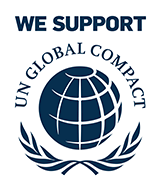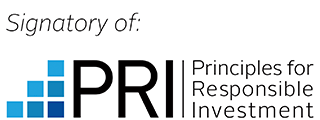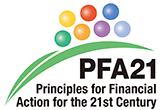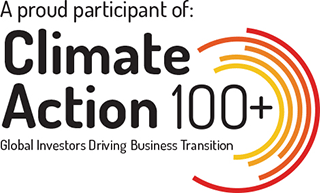The UN Global Compact
The T&D Insurance Group has become a participant of the United Nations (UN) Global Compact (UNGC), a cooperative framework between the UN and corporations to realize sustainable growth advocated by the UN.
The UNGC proposes ten principles applying to the four areas of the protection of human rights, the elimination of unfair labor practices, the protection of the environment and the prevention of corruption, and encourages companies to act in a responsible manner.
The T&D Insurance Group endorses the UNGC's philosophy, and T&D Holdings, representing the Group, has signed a memorandum declaring its support for the ten principles.

UNGC's Ten Principles
| Human rights | Principle 1 | Businesses should support and respect the protection of internationally proclaimed human rights; and |
|---|---|---|
| Principle 2 | make sure that they are not complicit in human rights abuses. | |
| Labour | Principle 3 | Businesses should uphold the freedom of association and the effective recognition of the right to collective bargaining; |
| Principle 4 | the elimination of all forms of forced and compulsory labor; | |
| Principle 5 | the effective abolition of child labor; and | |
| Principle 6 | the elimination of discrimination in respect of employment and occupation. | |
| Environment | Principle 7 | Businesses should support a precautionary approach to environmental challenges; |
| Principle 8 | undertake initiatives to promote greater environmental responsibility; and | |
| Principle 9 | encourage the development and diffusion of environmentally friendly technologies. | |
| Anti-Corruption | Principle 10 | Businesses should work against corruption in all its forms, including extortion and bribery. |
Principles for Responsible Investment (PRI)
In the T&D Insurance Group, Taiyo Life, Daido Life and T&D Asset Management have endorsed and signed the Principles for Responsible Investment (PRI)*. PRI are guidelines that encourage global financial institutions and institutional investors to promote investment activities in consideration of Environmental, Social and Governance (ESG) issues.
* The UN Principles for Responsible Investment (PRI) were formulated by the UNEP Finance Initiative and the UN Global Compact as a set of principles that would facilitate the reflection of the ESG viewpoint in the decision-making processes of financial investors.

The Six Principles of PRI
- Principle 1: We will incorporate ESG issues into investment analysis and decision-making processes.
- Principle 2: We will be active owners and incorporate ESG issues into our ownership policies and practices.
- Principle 3: We will seek appropriate disclosure on ESG issues by the entities in which we invest.
- Principle 4: We will promote acceptance and implementation of the Principles within the investment industry.
- Principle 5: We will work together to enhance our effectiveness in implementing the Principles.
- Principle 6: We will each report on our activities and progress towards implementing the Principles.
Spring*
In the T&D Insurance Group, Taiyo Life, Daido Life and T&D Asset Management take part in “Spring,” a collaborative engagement initiative focused on biodiversity issues.
* Spring: Established by Principles for Responsible Investment (PRI) with the aim of contributing to the global target of halting and reversing biodiversity loss by 2030 through support for collaborative engagement by investors.

Advance*
In the T&D Insurance Group, Taiyo Life, Daido Life and T&D Asset Management take part in “Advance,” an international initiative to practice collaborative engagement regarding social issues and human rights.
* Advance: Established by Principles for Responsible Investment (PRI) with the aim of encouraging human rights and positive outcomes, by functioning as a platform covering a wide range of social issues and facilitating the stewardship activities of investors.

Japan Impact-driven Financing Initiative
In the T&D Insurance Group, Taiyo Life and Daido Life have signed the Japan Impact-driven Financing Initiative*, a collaborative initiative involving Japanese financial institutions that share an impact-oriented approach.
* Japan Impact-driven Financing Initiative: Initiative to transform the flow of investment and financing funds to an impact-oriented approach in order to create a sustainable funding cycle that autonomously addresses environmental and social issues. Japanese financial institutions are working together to promote impact measurement and management.

Principles for Financial Action towards a Sustainable Society (Principles for Financial Action for the 21st Century)
T&D Holdings, Taiyo Life, Daido Life, T&D Financial Life, T&D Asset Management, and Pet & Family Insurance endorse the Principles for Financial Action towards a Sustainable Society (Principles for Financial Action for the 21st Century)*, and have become signatories to this voluntary initiative organized by Japanese financial institutions.
* The Principles for Financial Action for the 21st Century were formulated as guidelines for financial institutions that wish to fulfill their social responsibilities and play a role in the formation of a sustainable society. The principles were formulated by the Ministry of the Environment's Drafting Committee for Environmental Finance Principles, in which financial institutions from wide-ranging areas within the sector voluntarily participated.

Principles for Financial Action for the 21st Century
- [Principle 1] Basic stance
- Recognizing the responsibilities and roles that financial institutions themselves play in creating a sustainable society, we will take the initiative in implementing the best possible activities through our respective businesses, with the aim of creating positive environmental, social, and economic impact and mitigating negative impact.
- [Principle 2] Contribute to a sustainable global society
- We will lead the formation of a sustainable global society by developing and providing financial products and services that contribute to the creation and development of industries and businesses through innovation for the steady and just transition of society.
- [Principle 3] Contribute to the formation of sustainable local communities
- We will lead the formation of sustainable local communities by supporting solutions to environmental, social, and economic challenges based on local characteristics and by improving local inclusiveness and resilience.
- [Principle 4] Human capital development
- Recognizing the importance of human capital in financial institutions, we will develop human resources capable of thinking and acting independently on environmental and social issues.
- [Principle 5] Collaboration with diverse stakeholders
- Recognizing the importance of collaboration among financial institutions and other diverse stakeholders in creating a sustainable society, we will not only participate in such efforts, but will also play a proactive role.
- [Principle 6] Build sustainable supply chains
- We will proactively address environmental issues such as climate change and biodiversity, as well as human rights and other social issues, and build sustainable supply chains through constructive engagement with our business partners and other stakeholders, including those to whom we make investments and loans.
- [Principle 7] Information disclosure
- Recognizing that activities to enhance social sustainability are a managerial challenge, we will disclose information on our initiatives to a wide range of stakeholders and make constant improvements, based on domestic and international trends and disclosure frameworks.
Task Force on Climate-related Financial Disclosures (TCFD)
The T&D Insurance Group has stated its endorsement of the recommendations of the Task Force on Climate-related Financial Disclosures (TCFD)*, and we are keen to take action on disclosure of clear climate-related financial information.
* Task Force on Climate-related Financial Disclosures (TCFD): A task force established in December 2015 by the Financial Stability Board (FSB). It formulated its recommendations for clarified, comparable, and consistent information disclosure regarding the risks and opportunities posed by climate change. These recommendations were announced in June 2017.

RE100
The T&D Insurance Group has joined RE100*, an international initiative that aims to procure 100% of the electricity used in business activities from renewable energy sources.
To realize a decarbonized society, the Group has set a goal of achieving net-zero CO2 emissions by FY2040. To achieve this goal, the Group has set a new interim target of “60% of electricity consumption to be derived from renewable energy sources by FY2030.” Taking advantage of its membership in RE100, the Group will actively promote the transition to renewable sources for the electricity it uses.
* RE100 (Renewable Energy 100%): Initiative bringing together companies aiming to procure 100% of the electricity used in business from renewable energy. This initiative is led by international non-profit the Climate Group in partnership with CDP.

Climate Action 100+
Taiyo Life, Daido Life, and T&D Asset Management are participating in Climate Action 100+, a global investor-led initiative calling for companies with high greenhouse gas emissions to respond to climate change through cooperative engagement.

Participation in the Task Force on Nature-related Financial Disclosures (TNFD) Forum
The T&D Insurance Group endorses the efforts of the Task Force on Nature-related Financial Disclosures (TNFD)* and has joined the TNFD Forum, which supports its activities. In September 2024, we also registered as a TFND Adopter and are working on disclosures in line with the TNFD framework.
* Taskforce on Nature-related Financial Disclosures (TNFD): An international organization founded in June 2021 to establish a disclosure framework for private companies and financial institutions to appropriately assess and disclose risks and opportunities related to natural capital and biodiversity. The final recommendations were released in September 2023.

The Principles for Responsible Institutional Investors (Japan’s Stewardship Code)
Three of the Group’s companies, Taiyo Life, Daido Life, and T&D Asset Management endorsed and expressed their commitment to the Principles for Responsible Institutional Investors (Japan’s Stewardship Code) in May 2014. Details regarding the policies of each company with respect to the Principles, policy on exercising voting rights, status of exercising voting rights, and self-evaluations are published on the companies’ respective websites (Japanese).
* Since T&D Financial Life does not directly invest in listed stocks, and is not planning to do so in the future, it is not expressing support for the Stewardship Code.
The Principles of the Code
So as to promote sustainable growth of the investee company and enhance the medium- and long-term investment return of clients and beneficiaries,
- Institutional investors should have a clear policy on how they fulfill their stewardship responsibilities, and publicly disclose it.
- Institutional investors should have a clear policy on how they manage conflicts of interest in fulfilling their stewardship responsibilities and publicly disclose it.
- Institutional investors should monitor investee companies so that they can appropriately fulfill their stewardship responsibilities with an orientation towards the sustainable growth of the companies.
- Institutional investors should seek to arrive at an understanding in common with investee companies and work to solve problems through constructive engagement with investee companies.
- Institutional investors should have a clear policy on voting and disclosure of voting activity. The policy on voting should not be comprised only of a mechanical checklist; it should be designed to contribute to the sustainable growth of investee companies.
- Institutional investors in principle should report periodically on how they fulfill their stewardship responsibilities, including their voting responsibilities, to their clients and beneficiaries.
- To contribute positively to the sustainable growth of investee companies, institutional investors should develop skills and resources needed to appropriately engage with the companies and to make proper judgments in fulfilling their stewardship activities based on in-depth knowledge of the investee companies and their business environment and consideration of sustainability consistent with their investment management strategies.
- Service providers for institutional investors should endeavor to contribute to the enhancement of the functions of the entire investment chain by appropriately providing services for institutional investors to fulfill their stewardship responsibilities.
Basic Policy on Corporate Governance
T&D Holdings has expressed its acceptance of the Corporate Governance Code that has applied to listed companies since June 2015 for the purpose of ensuring the T&D Insurance Group’s sustained growth and the enhancement of its corporate value over the medium- to long- term. T&D Holdings has also defined its principles-based initiatives and policies in the Basic Policy on Corporate Governance.
https://www.td-holdings.co.jp/en/csr/csr-policy/corporate.php






